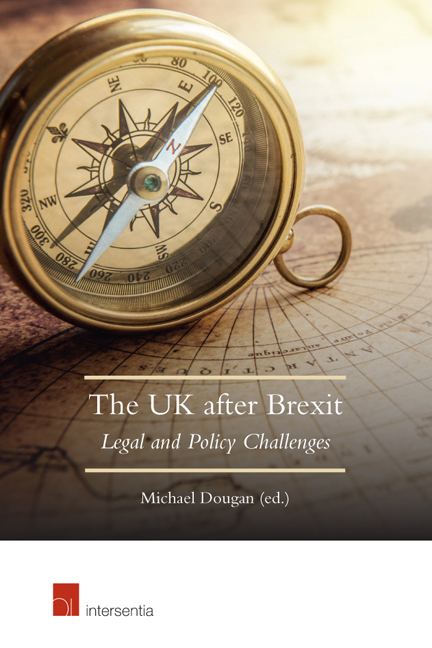Book contents
- Frontmatter
- Contents
- List of Authors
- Editor's Introduction
- Part I Constitutional Issues
- Part II Substantive Policies
- Chapter 5 Brexit and Employment Law
- Chapter 6 UK Environmental Law Post-Brexit
- Chapter 7 Extracting the UK from EU Financial Services Governance: Regulatory Recasting or Shadowing from a Distance?
- Chapter 8 Intellectual Property Law and Brexit: A Retreat or a Reaffirmation of Jurisdiction?
- Chapter 9 May We Stay? Assessing the Security of Residence for EU Citizens Living in the UK
- Chapter 10 Cross-Border Criminal Cooperation aft er Brexit
- Part III External Relations
- About the Editor
Chapter 7 - Extracting the UK from EU Financial Services Governance: Regulatory Recasting or Shadowing from a Distance?
from Part II - Substantive Policies
Published online by Cambridge University Press: 13 October 2018
- Frontmatter
- Contents
- List of Authors
- Editor's Introduction
- Part I Constitutional Issues
- Part II Substantive Policies
- Chapter 5 Brexit and Employment Law
- Chapter 6 UK Environmental Law Post-Brexit
- Chapter 7 Extracting the UK from EU Financial Services Governance: Regulatory Recasting or Shadowing from a Distance?
- Chapter 8 Intellectual Property Law and Brexit: A Retreat or a Reaffirmation of Jurisdiction?
- Chapter 9 May We Stay? Assessing the Security of Residence for EU Citizens Living in the UK
- Chapter 10 Cross-Border Criminal Cooperation aft er Brexit
- Part III External Relations
- About the Editor
Summary
INTRODUCTION
Much of UK policy, political and industry discourse since the 23 June 2016 Brexit decision has been framed in terms of the implications for financial services. The stakes are high. The UK hosts some 35 per cent of the wholesale financial market activities (including trading, asset management and derivatives-related risk management services) provided in the EU and which are essential to the liquidity, stability and efficiency of the EU financial system; and in the region of 25 per cent of UK financial services revenue derives from EU-related business. The interdependencies between the UK and the EU are many and deep; the potential for significant market dislocation and economic disruption if EU/ UK market access arrangements are not secure (or if a workable transitional arrangement is not in place) when the UK leaves the EU is real. How the negotiations treat the technicalities of market access, whether through bespoke arrangements in a free trade agreement, changes to the EU rules which currently govern ‘third country’ access to the EU financial market, or the current third country access mechanisms, is of signal importance for the EU and UK financial systems.
The discussions thus far have not focused closely on how Brexit might shape UK financial governance – or the regulatory, supervisory and enforcement arrangements which protect the public interest in a stable and secure UK financial system and which also manage how the UK engages with the international market beyond the EU. This chapter speculates on the impact Brexit may have on UK financial governance and on whether major, re-setting change is likely to follow or whether the UK regime can be expected to shadow EU financial governance. Section 2 examines the relationship between UK and EU financial governance, the extent to which both systems are intertwined and whether there is ‘pent up’ demand for UK governance change. Section 3 considers how UK financial governance might evolve in relation to the risks and challenges which Brexit poses. Section 4 considers the potential for re-setting change. Section 5 briefly concludes.
- Type
- Chapter
- Information
- The UK after BrexitLegal and Policy Challenges, pp. 135 - 158Publisher: IntersentiaPrint publication year: 2017
- 2
- Cited by

